Paper 2: Devolution of powers & finances up to local levels & challenges therein
Concerns in Urban Local Governments
Status of urban local government
- Twenty-five years ago, the Constitution underwent what is arguably its most significant transformation with the passage of the 73rd (mandating the creation of panchayats) and the 74th (creation of municipalities) Constitutional Amendments
- As the Central Government’s Smart Cities mission completes three years this month, it’s the right time to examine India’s tryst with municipal governance
Concerns in 3-tiers
- First, elected representatives at the city-level are rendered powerless by making them subservient to the State government
- In most municipal corporations, while the mayor is the ceremonial head, the executive powers of the corporation are vested with the State government-appointed commissioner
- Municipal corporations are further denied their political role by the continued operation of various parastatal agencies created by the State government.E.g. urban development authorities (building infrastructure), public corporations (water, electricity, transportation services, etc) Even urban planning and land-use regulation is with State government-controlled development authorities. These agencies function with certain autonomy.Moreover they are accountable only to the State government, and not the local government.Parastatal agencies and unelected commissioners are pre-74th Amendment legacies that have not been undone.
- These agencies, which function with a certain autonomy, are accountable only to the State government, not the local government
- Even urban planning and land-use regulation (globally a quintessential local government function) is with State government-controlled development authorities
- Functions in 12th Schedule which a State government is expected to devolve to the local government should be re looked. It does not include essential civic issues such as urban transportation, housing or urban commons.
- Even for performing functions that are within its purview, local government requires State government permissions. These include functions like levying local taxes or undertaking civic projects above a certain budget. Municipalities are not yet autonomous units to be truly called as the “third tier” of government in India’s federal system. The creation of parallel institutions further dis-empowers the elected local government. It shows how higher levels of government distrust local politics.
- The 74th Amendment contains an industrial township exception. A municipality need not be constituted in areas which are declared as industrial townships. These provisions have been employed by State governments to keep local governments weak.
Way forward
- Indian cities have grown exponentially over the last 25 years, with some crossing the 10 million population mark
- As cities struggle to meet the basic needs of their inhabitants, we must re-examine the existing modes of organizing power in urban India
- While urban governance reforms can take multiple shapes, they must be foregrounded in the political empowerment of local government that furthers local democratic accountability
- Local governments must be increasingly acknowledged as inherently political spaces.
- The present model of urban governance vesting power in a singular municipality should be re-looked.
- Urban governance reforms should focus on political empowerment of local government that promotes local democratic accountability.
Paper 2: Issues relating to development & management of Social Sector/Services relating to Health, Education, Human Resources
New Norms in UGC
Change in UGC regulations
- The University Grants Commission (UGC) has brought out a new set of regulations to alter the conditions for recruitment and promotion of college and university teachers
- This is done to make universities more focused on research and colleges on the teaching-learning process
New norms
- Research will no longer be mandatory for college teachers for promotion
- College teachers will be graded on teaching rather than research
- They can earn grades for other activities too — like social work, helping in adoption of a village, helping students in extra-curricular activities, contributing teaching material to Swayam, the MOOCS platform for online material
- The regulations also make teaching hours flexible.Indians who had been awarded a doctoral degree from any of the top 500 global universities would be eligible to teach in Indian universities without the requirement of any equivalence certificate or NET as soon as the regulations are notified
Paper 2: Issues relating to development & management of Social Sector/Services relating to Health, Education, Human Resources
Faults in NHPS
Why in News
- The Model Tender Document For The Selection of Implementing Agencies For the National Health Protection Scheme (NHPS), released by the Union Ministry of Health and Family Welfare tries to address various concerns related to NHPS
- The document states that nearly 47 percent of the packages under the NHPS,
What document states ?
- The document states that nearly 47 percent of the packages under the NHPS, including those related to heart ailments and cancer, require pre-authorisation
- This means hospitals impanelled under the scheme cannot perform these procedures until they have an authorization letter from the NHPS’s Implementation Support Agency
Why this system of checks?
- Current scheme’s predecessor, the Rashtriya Swasthya Bima Yojana, was riddled with unethical practices such as unnecessary hospitalization, needless investigations and billing for superfluous and unrelated treatment packages
Associated Concerns
- Hospitals might shift the onus of obtaining the authorization letter on the critically-ill or their families
- Several procedures, including emergency consultation for acute colic, nebulization for an asthma attack, hypoglycemia in a diabetic and treatment of “dengue without complication”, will be covered by the scheme only if the treatment is availed in a government hospital
- Without timely treatment, a dengue fever can aggravate to a life-threatening disease
Way forward
- Checks on the impanelled hospitals are well in order under NHPS
- It would prevent private hospitals to milk the NHPS by prescribing unnecessary investigations
- But it should also be ensured that these checks do not come in between providing emergency care to critically ill patients or put an extra burden on their families
Paper 2: India & its neighborhood- relations
Rift in India-Maldives ties
Why a Rift in ties?
- There has been a series of setbacks in India-Maldives ties, starting from March 2015 when Prime Minister Narendra Modi canceled a visit
- Recent moves by Abdulla Yameen, President of the Maldives, have put Malé on a collision course with New Delhi
- India criticised the government for its incarceration of former President Maumoon Abdul Gayoom and Chief Justice Abdulla Saeed, sentenced to 19 months in prison for an alleged plot to unseat Mr. Yameen
- The Maldives has conveyed to India that it will not extend beyond June 30 the lease of Indian helicopters or the visas of personnel manning them
- This signals a marked downturn in defense cooperation between the two countries, which normally coordinate maritime and EEZ (Exclusive Economic Zone) patrols together.
- Hundreds of Indians offered employment in the Maldives at resorts, hospitals and colleges have been denied work visas for the past few month
Paper 2: Bilateral, regional & global groupings & agreements involving India &/or affecting India’s interest
No Assumption Island in Indian Ocean
What was the deal?
- The deal was to include a 20-year access to the base, as well as permission to station some military personnel on the ground with facilities on the island funded by India, owned by Seychelles and jointly managed by both sides.
- The deal to build a military base at Assumption Islands was struck in principle in 2015 during PM Modi’s visit to Seychelles
Setback for India’s vision in Indian Ocean
- The decision by the Seychelles President to drop the deal in the face of protests over a perceived loss of sovereignty is a blow to the government’s “SAGAR” (Security and Growth for All in the Region) programme, announced by Mr. Modi during a visit to Indian Ocean Rim (IOR) countries in March 2015.
- It also comes amid India’s troubles with another IOR country, the Maldives, where the government has demanded that India withdraw two helicopters, pilots and personnel from its atolls that had been sent there to help with maritime patrols.’
Paper 3: Development & employment
No Parenting Leave for Father in India
Why in News?
- India is among almost 90 countries in the world without national policies in place that ensure new fathers get adequate paid time off with their newborn babies
- Almost two-thirds of the world’s children under one-year-old, nearly 90 million, live in countries where their fathers are not entitled by law to a single day of paid paternity leave as per study by UNICEF
Need of Paternity Leave
- Evidence suggests that when fathers bond with their babies from the beginning of life, they are more likely to play a more active role in the child’s development
- Research also suggests that when children positively interact with their fathers, they have better psychological health, self-esteem and life-satisfaction in the long-term
Steps by India
- In India, officials are proposing a Paternity Benefit Bill for consideration in the next session of Parliament which would allow fathers up to three months of paid paternity leave
What UNICEF proposed
- UNICEF modernized its approach to parental leave provisions, with up to 16 weeks of paid leave for paternity across all of its offices worldwide
- This leave is for fathers of new infants to bond with their child and foster better relationships
- UNICEF has become the first United Nations agency to extend such leave beyond the standard four weeks




